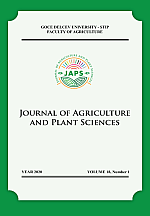THE INFLUENCE OF DIFFERENT CONCENTRATIONS OF PLANT ESSENTIAL OILS ON GROWTH AND REPRODUCTION OF Salmonella enteritidis
DOI:
https://doi.org/10.46763/JAPS2010063sAbstract
Plant essential oils have been reported to possess antimicrobial properties and therefore have potential usage as natural antimicrobials of food. The aim of the study was to examined the antimicrobial effect of sweet basil and thyme essential oils against growth and reproduction of Salmonella enteritidis reference strain ATCC 13076 (S. enteritidis RS) and Salmonella enteritidis epidemical strain (S. enteritidis ES) cultivated on plate. Therefore, the samples were prepared as a dip application from different concentrations of sweet basil and thyme essential oils (1; 2.5 and 5%) with initial concentration of bacteria from 109 CFU/mL and were cultivated on plate. The control samples were prepared as dip application of bacteria without added essential oils. All samples were exposed at 37°C and 46°C. The growth of S. enteritidis RS and S. enteritidis ES was observed only in the control samples without added sweet basil and thyme essential oils. There wasn’t any growth of both Salmonella еnteritidis strains in the samples dipped in the 1; 2.5 and 5% sweet basil and thyme essential oils. The results from the ANOVA indicate that the utilized essential oils in combination with temperature regime was significantly (p <0.001) reduced the CFU number of the both strains of Salmonella enteritidis. These results support the possibility of using sweet basil and thyme essential oil as natural preservatives in food to contribute in the reduction of Salmonella enteritidis at acceptable levels in view to prevent the risk for consumers.
Downloads
Published
Issue
Section
License
The intellectual property and copyright on the original content of all scientific contributions in the published paper shall remain with the authors. Authors give permission to the JAPS owner to publish the paper. All authors agree to publish the paper under Attribution-NonCommercial-NoDerivatives 4.0 International license (CC BY-NC-ND 4.0).

